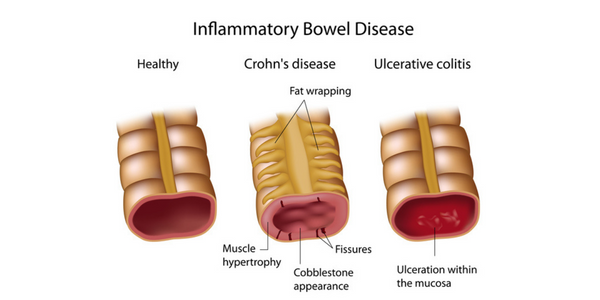What is Crohn’s disease
Crohn’s disease causes inflammation in part of your digestive system. Crohn's can affect any part of it, but it most often involves your small intestine and colon.
Crohn's and another disease, ulcerative colitis, are part of a group of conditions called inflammatory bowel disease.

Causes
Several factors, such as heredity and a malfunctioning immune system, likely play a role in its development.
A few things can make you more likely to get Crohn’s disease:
- Genes. Crohn's disease is often inherited.
- Age. Most people are diagnosed before age 30, but the disease can happen in people in their 50s, 60s, 70s, or even later in life.
- Smoking. Smoking can make Crohn’s more severe and raise the odds that you’ll need surgery.
- Medications. Nonsteroidal anti-inflammatory drugs (NSAIDs) can lead to inflammation of the bowels that makes it worse.
- The world around you. People who live in urban areas or industrialized countries are more likely to get Crohn’s.
- Diet. If you eat a lot of high-fat or processed foods, your odds of Crohn’s could go up.
- Infection. Bacteria linked to Crohn’s include Mycobacterium aviumparatuberculosis, which causes a similar condition in cattle, and a type of E. coli.
There are five types of Crohn’s disease, based on what part of your digestive tract is affected.
- Ileocolitis, the most common form of Crohn’s, involves your colon and the last part of your small intestine (called the terminal ileum).
- Crohn’s colitis or granulomatous colitis affects only your colon.
- Gastroduodenal Crohn’s disease is in your stomach and the first part of your small intestine (called the duodenum).
- Ileitis affects your ileum.
- Jejunoileitis causes small areas of inflammation in the upper half of your small intestine (called the jejunum).
Symptoms
Signs and symptoms of Crohn's disease can range from mild to severe. When the disease is active, signs and symptoms may include:
- Diarrhea
- Fever
- Fatigue
- Abdominal pain and cramping
- Blood in your stool
- Mouth sores
- Reduced appetite and weight loss
- Pain or drainage near or around the anus due to inflammation from a tunnel into the skin (fistula)
- Inflammation of skin, eyes and joints
- Inflammation of the liver or bile ducts
- Kidney stones
- Iron deficiency (anemia)
- Delayed growth or sexual development, in children
Treatment
Your medical history & symptoms will be discussed. Some lab tests would be done, like:
- Bloodtests, including blood counts
- Stool samples to rule out infections as the cause of diarrhea
- Imaging tests
- MRI. To show a clear picture of the inside of your body without using radiation.
- CT scan. This test uses X-rays to make detailed images of your internal organs.
- Endoscopy.
- Balloon-assisted enteroscopy. This test uses balloons that inflate and deflate to pull a flexible tube called an endoscope through your small intestine. A tiny camera on one end gives a view of the inside of your guts.
- Capsule endoscopy. You’ll swallow a tiny, pill-sized camera to give the doctor a closer look at your small intestine.
- Upper endoscopy. This helps to see your esophagus, stomach, and duodenum.
- Colonoscopy or sigmoidoscopy. This gives a clear picture of your intestines and helps take a tissue sample to study.
Medication
Crohn's disease is mostly treated with medications, including:
- Corticosteroids, a more powerful type of anti-inflammatory drug.
- Anti-inflammatory drugs
- Immune system modifiers
- Antibiotics
- Drugs for diarrhea
Surgery
About 66% to 75% of people with Crohn's disease will need surgery. It can help with complications or when medications don't work. Common procedures include:
- Anastomosis. The diseased part of the bowel is removed and joined with the two healthy ends together. Many people are symptom-free for years after, but it isn’t a cure. Crohn's disease often comes back at the site of the anastomosis.
- Ileostomy. You might need this if your rectum is diseased and the doctor can’t use it for an anastomosis. This procedure connects your intestine to the skin of your torso. The result is an opening in the skin that can collect waste products in a special pouch that you empty.



